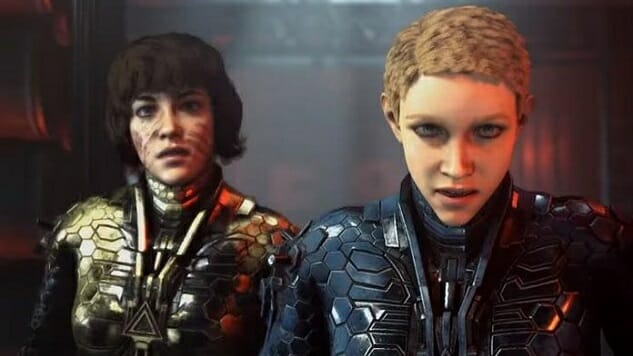Wolfenstein: Youngblood Feels Out of Touch in a World where Right-Wing Extremism Is on the Rise

As a series, Wolfenstein has always been predicated on the expectation of consensus. It operates on the assumption that everyone knows Nazis are the bad guys. In the past this was a pretty safe bet; in the decades after World War II, hating Nazis was all but an American pastime. It was from this spirit that Wolfenstein was born, justifying its celebration of violence by choosing an acceptable target. But a lot can change in just a short time, and in the three years since the last Wolfenstein game came out, the entire political landscape of several countries has changed. How relevant is a Nazi killing fantasy in this day and age, with Neo-Nazism on the rise? When fascism is only an arm’s length away, can the catharsis still be found?
Wolfenstein: Youngblood introduces the duo of Jessica and Sophia, twin daughters of B.J. Blazkowicz, who are now all grown up and ready to do some Nazi killing of their own. They are on a mission to find their missing father in Nazi-occupied 1980s France, and must work together to support the French Resistance (with help from their friend Abby Walker) in order to track him down. The partnering of the twins, either with a live co-op or A.I. partner, allows for some new combat features that freshen up the gameplay of the previous games. Jess and Soph can revive each other in battle, boost each other’s health levels, engage in strategic flanking and back each other up in ways that subtly revitalize stealth and shooting aspects of the game. As they set out to gain access to B.J.’s last known location, the girls rescue resistance fighters, retrieve intel, and sabotage Nazi operations while aided by their power suits and a new character skill tree to augment their abilities. Together they establish their birthright and legacies as Nazi killers, giving us a glimpse at what’s in store for the third game as our intrepid group prepares for the rise of the Fourth Reich.
Wolfenstein: Youngblood, like many not-sequels that serve as a stop-gap between numbered installments in a series, is a chance for the developers to try out something new before the next big game. And if this is a sign of what’s to come, there are some great improvements potentially on the horizon. While the new co-op elements may seem shallow or gimmicky, for me they were the highlight of the game. Wolfenstein: Youngblood is reminiscent of the many spirited hours I used to spend playing Left 4 Dead and Perfect Dark with my own sisters. There’s something about having a blood relative as a teammate that makes you more intense and protective, and that loyal instinct shone through every moment as I watched Jess and Soph interact, whether flipping each other off in an elevator or picking each other up in battle. There are few things as pure and wholesome and good as the friendship between teenage girls, and the one between Jess, Soph and Abby is utterly endearing. Hanging out with them is enormous fun.